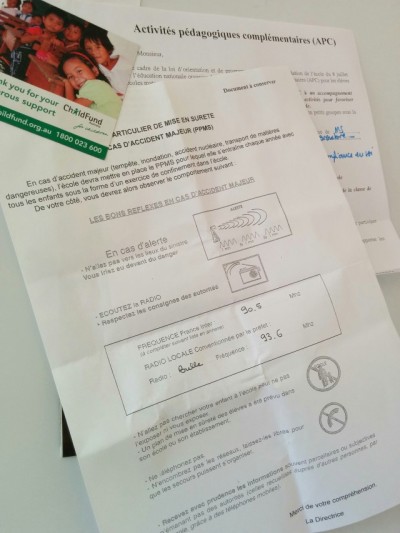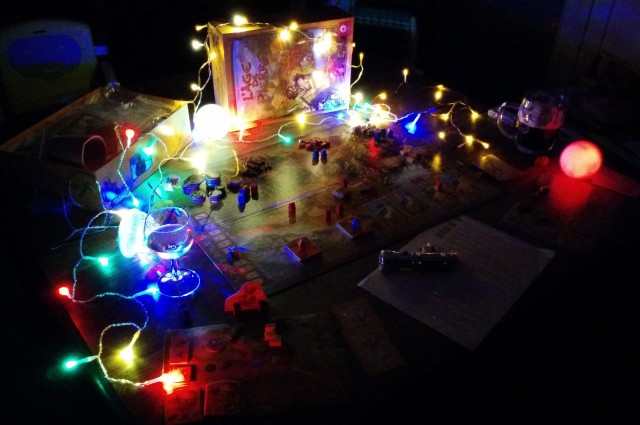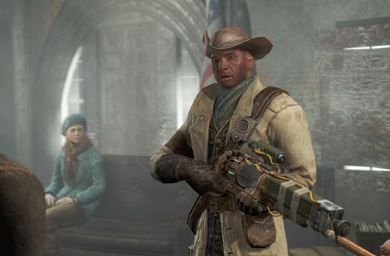

**Editor’s Note**
To celebrate National Novel Writing Month, we will be publishing the following fictional tale serially over the next few weeks. This first post provides the background of this story, which will be followed by 4 individual stories as told from the perspective of the people experiencing the event from different locations in the world.
This page will be updated after each new radio broadcast, and next progression of those five stories. Bookmark this page, and follow along with the tale!
UPDATE 11/20/2015: If you’ve already read Part I, make sure to check out Part II!
UPDATE 11/28/2015: If you’ve seen Parts I and II, time to read Part III!
UPDATE 12/7/2015: The Finale of the apocalypse series, Part IV!
It’s the year 2018. The global community has been battling the scourge of terrorism since the attacks on 9/11. The train bombs in Madrid in 2004, commuter train bombings in Mumbai in 2006, and the bombings in Lebanon, Iraq, and Turkey from 2012 through 2015 — all part of the growing drum-roll of global terrorism.
By 2017, the global “War on Terror” was reaching climax. With the vague, leaderless organization of ISIS growing its membership from disenfranchised youth around the world, the organization grew more sophisticated, and its attacks more advanced. The group was no longer known as ISIS, but instead called itself the HUAM – the “Human Undertaking for All Muslims”. Its membership was no longer primarily confined to the Middle East, with large factions existing in every major country in the world.
In 2017 alone, elements of HUAM pulled off two advanced, highly destructive attacks.
On April 14th, HUAM hackers overtook the Automatic Train Control (ATC) system of the Kyushu Shinkansen bullet train, increasing train speed to uncontrollable levels and driving it off the tracks. 252 passengers were killed, and 724 were injured.
On July 4th, a team of 12 HUAM attackers overpowered security personnel at the New York Stock Exchange, holding the entire floor of the Exchange hostage and threatening brokers for their system passwords. ISIS hackers siphoned billions into untraceable terrorist bank accounts before an elite SWAT team recaptured the Exchange. In the exchange of gunfire, 36 innocent civilians died, all terrorists were killed, 4 SWAT team members were killed and 6 were injured. The money was never recovered.
By the end of 2017, intelligence organizations from every major country in the world were warning their governments that a major terrorist threat – the likes of which the world has never seen before – was imminent.
On January 17th, in 2018, the President of the United Nations Security Council issued the following warning to the global community.
“The Security Council reaffirms its primary responsibility for the maintenance of international peace and security, in accordance with the Charter of the United Nations.
The Security Council notes with concern, that terrorism poses one of the most serious threats to international peace and security that the world has ever known. It is an attack on human rights, the social and economic development of all Member States, and overall global stability and prosperity.
This threat has become more diffuse, more technologically advanced, and always motivated by intolerance or extremism.
The UN Security Council urges all member states to commit to combating this threat, to preserve the peace and prosperity of the entire world. The future of the human race may very well depend on this collective effort.”
Only 28 days following that statement, HUAM delivered an advanced and catastrophic global attack. It was an attack that not only proved the technological prowess of the group’s most elite hackers, but it also would reveal just how fragile the global infrastructure was to the threat of hackers.
On February 14th, 2018, HUAM hacked into major power utilities in nearly every industrialized nation in the world. They infiltrated utility control systems using a Stuxnet-like virus that sent power-generation equipment out of control, causing permanent damage.
By 8:44 A.M. New York time, every light, every refrigerator and every computer system turned off at the same time. The outage spread across the United States, from Boston to Los Angeles, in less than 35 minutes. The European power grid managed to stay online only 15 minutes longer than the U.S. system. But by 9 A.M. New York time, all of Europe was powerless. Asia and the Middle East were the last to fail, with those nations losing all power by 9:12 A.M. New York time.
By 9:15 A.M., the whole world was cast into electronic darkness.
Emergency generators in radio towers across the world kicked into gear, and by 9:30 A.M., local emergency broadcasts were being relayed to all citizens in every nation, with the pre-canned electronic voice advising citizens to stay tuned for further instructions.
By 11:15 A.M., governments from around the world reported to the United Nations that primary utilities had been destroyed. The United Nations was provided authority to manage the crisis, with Emergency Management personnel from every member state contributing to the effort. The President of the Security Council was provided with a communication channel to communicate information to all citizens throughout the world, via Emergency Radio Broadcasts.
At 2:45 P.M. New York time, the President of the United Nations Security Council, the delegation of France headed by Ambassador Alexandre Durand, issued his first announcement to the world.
*****
United Nations Security Council Emergency Radio Broadcast: February 14th, 2018 @2:45 P.M
*****
“Citizens of the world. This is Ambassador Alexandre Durand, serving for the French Delegation of the President of the Security Council of the United Nations. I understand that most of you were probably expecting an update from your own government leadership.
I would like to assure you at this time that your government’s leadership has provided the United Nations with full authority to communicate to you, the events of the last 24 hours, and the emergency response that will be taking place in response, at a global level.
I must inform you that the power outage you are experiencing is not due to a weather crisis or a local technical failure. Every major power grid in every industrialized nation has failed at this point in time. This event was caused by a terror attack that took place at approximately 1:45 P.M. Greenwich Mean Time. Terrorist hackers infiltrated major power utilities around the world, with the intent purpose of disabling all power systems in every nation. The attack was unfortunately successful in accomplishing that goal.
At this point in time, we do not believe that any citizen is in imminent danger of any further terrorist threat. Please be assured that no nation in the world is currently under any sort of military threat from any other nation. We have heard from your governments, and the primary goal of every government, in every nation, is to restore not only your power, but to counter this ongoing terrorist threat through collaboration and peace amongst nations.
We will overcome this egregious threat together, as a global community, united as one.
At this time, there is no estimate as to how long it will take for local power systems to come back online. However, due to the nature of the damage on major equipment, we are advising citizens to treat this as they would any long-term power outage that would occur during a Winter storm or a hurricane.
The great Victor Hugo once wrote, “There is one thing stronger than all the armies in the world, and that is an idea whose time has come.”
I propose this idea to you: We are a greater people than this terrorist threat. We must respond with unity, with peace and with the conviction that we will rise from this with even greater determination and will to overcome and overpower this evil. This is our idea whose time has come. Let us rally behind it together.
This message will repeat hourly, and will be updated in 24 hours.
Stay safe.”
–by Christian Cawley
“I’ve heard it all before.”
Six hours had passed since everything stopped, and Kevin Morley was still trapped. Worse still, the last three hourly plays of the emergency message had come around far too quickly. His watch told him it was 7.46 in the evening, and his brain told him that the school reunion wasn’t going to happen.
He sat in his “office” – in reality, the control desk of a vital piece of chemical storage at an industrial facility in the north east of England – watching the analogue gauge to assess the status of the volatile mass inside the silo forty feet away. In a moment of optimism around teatime, Morley had changed into his evening gear ready for the party, booked at a nearby hotel. Of course, now he knew that if anyone else made it to the venue, they would be partying alone.
A handful of site phone calls had been made, all but one incoming, and all of those to confirm that Kevin had switched control to manual so that the remaining electrical supply – provided by a gas-fired power station at the other side of the complex – could be dedicated to maintaining the electromagnetic seals.
He’d been doing this job long enough to know that if anything went wrong, he wouldn’t have a chance; Kevin was glad of that. No, it was the people in the nearby towns that had to worry.
They would suffer.
N0v4 x18 was developed accidentally during the Cold War. Its main industrial use was in the development of EMP-proof microprocessors, but in truth this was merely a happy accident. Current owners Kingpar Industries (UK) were all too glad to have found a way to monetize the substance, which was more or less indestructible and certainly non-pliable.
They called it “the beast,” and Kevin Morley was essentially a prison guard.
Morley’s eight hour shift would normally have swapped around 2pm, handing over to one of his four colleagues and heading home to enjoy the rest of the day – in this case, collecting his son. His sole outgoing call had been to ensure Dominic was home safe from school.
Morley’s only window on the world was behind him. Swinging around, he checked the current scene. The entire site seemed deserted, although he knew that wasn’t entirely true – N0v4 x18 wasn’t the only dangerous substance in storage here. While making calls was discouraged – after all, air conditioning had to be maintained – Kevin knew that various familiar faces were trapped, just like him.
Looking down at the notepad on his lap, Kevin Morley tried to assess what they knew, and what the United Nations were claiming. To him, it seemed utterly unlikely for hackers to take out every single power grid in every industrialized nation. Further, he was doubtful that terrorists acting in such a way would not be sponsored by at least one such nation.
He frowned at his best alternate theory, however. As exciting as bases under volcanos might sound, Kevin Morley ultimately doubted that a James Bond-type villain was behind it. And again, as he had done an hour before, following the previous broadcast, Morley sighed as he realized that he didn’t really buy into the United Nations taking precedence over the British Government. It wasn’t sitting well with him, so he doubted it was going down well with a lot of people across the country.
Where was the British government? Where was help?
A glimmer of light caught Kevin Morley’s eye. Something reflected off the solar charger… of course! Earlier that afternoon, he’d dug the old solar powered charger out of his kit bag, broken during last summer’s Glastonbury festival, and spent some time fixing it – which basically meant twisting some wires back together in the absence of a soldering iron, solder, and a power supply he was authorized to use.
Checking his phone, however, it was clear that as smart as his battered Sony Xperia Z5 was, it wasn’t capable of miracles. The mobile network was down. However, he was able to detect a wireless network from the Shell oil refinery admin center around 100 meters away. Gingerly, Kevin Morley attempted to connect, using the passkey saved on his phone during a leaving party in the Shell offices six months earlier.
No, they hadn’t changed it; yes, multinational mega conglomerate oil producer had access to the Internet. But there was little out there. Sites were almost all offline, other than the BBC, Google, the UN, the EU, and the British and US government home pages, and all displayed the same truncated version of Durand’s message. It wasn’t difficult to resist the temptation not to click play to hear it all again.
Morley quickly crossed the room to check the gauges again, before opening an IRC app. Minutes later, he was in a chat room, reading comments, theory after theory, about what was “really going on”.
It was the Islamofacists, no it was the Greys. Some reckoned the lizard people had shed their disguises and taken control – of course, they were already in control, argued the same people, thereby making the unveiling more than a little pointless.
Perhaps it was a solar event of some sort, or a heavenly phenomenon hitherto unrecorded and therefore new. Whatever the case, Kevin could see that no one had any answers. But the opportunity to have contact with people and see how scared they were hit home.
He had to get back to Dominic.
And then his mind was made up for him. The room was enveloped in red lights and sound. He dropped the phone, and looked at the gauges – from the far side of the room, he could see they were all in red.
Running to the console, he pulled levers, twisted dials, and flicked switches.
Nothing.
“I WILL NOT DIE HERE!”
Grabbing his chair and twisting, Morley flung it at the window, cracking the pane. He had seconds…
…and then the lights went out. The beast was loose.
–by Angela Alcorn
No one would have believed, in the last years of the nineteenth century, that human affairs were being watched from the timeless worlds of space.
Okay, so that’s a little over the top — there are no martians on Earth (I hope), and we are not going to be running away from anything (I hope). But, something is seriously up. Something big.
Why am I writing this? Well, maybe most of civilization will die off and some historian of the future will find these handwritten scraps of paper in my safe and get a glimpse into what the final days of normality were like. Sort of like Anne Frank’s diary, only far less interesting. Or most likely it will just rot along with everything else since we’re totally doomed.
If I’m really lucky things will get back to normal and I can type it all out for my blog. Then the rellies in Australia can see how we dealt with all this. Shit, I wonder how they’re all coping. At least it’s nice and warm there!
Okay, where do I start? Let’s start from this morning.

This morning was innocuously boring and typical for a Wednesday in every possible way: I dropped the kids off at school, went for a jog and came home for a late breakfast. I did a little work, then had some lunch with Bruce after he took the kids to after-school care (yeah, France doesn’t have school on Wednesday afternoon — we’re used to it now). Bruce left to go back to work, I started getting into some serious editing and then the MakeUseOf site went down. I lost a little bit of work, but I’d saved a few minutes before, so it was no big deal. I thought it was weird though, since they’re usually reliable.
Thinking things would be back up shortly, I headed to Slack to let people know. Slack was down. As I opened up Gmail, I noticed my Chromecast fish tank had disappeared and my Raspberry Pi Musicbox playing Spotify had stopped too, which was the first clue that the power was out. After a half-hearted look at the switch breakers in the shed, I realised it was a blackout.
My Chromebook still had power for a good 6 hours yet, so I tried doing some other work. But nothing was working AT ALL. Like the whole Internet was dead. At one point I switched back to my Gmail tab and thought I saw some life, but I was wrong*. Dead too. I sent Bruce an SMS telling him about the blackout and asked him if it took out the office, too. It didn’t send, but I didn’t notice that then.
So, that was just after 3pm. I was unable to get any work done, there was no power and I didn’t have to pick up the kids for two hours. I did what any reasonable person would do, and I read a book. Probably the last peaceful moment of my life.
Eventually I went to pick up the kids and had a chat with the staff at the after-school care. The blackout hadn’t really bothered them much as all the kids were playing outside, but they said they’d had a strange message from the Mayor and that this blackout might be more serious than we thought.
As soon as I got home I thought I’d dig up that old battery radio from the shed, so I could put on the emergency channel. Luckily, the school sends flyers home yearly with the emergency channel details on it, so I had the frequency I needed right there on the fridge.

I also pulled out all the battery-operated LED lights and started wondering what sort of cold meal we should eat from the fridge tonight. If I was really energetic, I’d have gotten the camping gas burner out of the shed, but the fridge had been off for a few hours already and I figured we should eat whatever was going to go off first.
Bruce got home around sunset, saying his boss had been in touch with a few contacts of his and it seemed all of the power in France was off. Despite the imminent doom, we ate our sandwiches and played board games surrounded by Ikea Christmas lights. Thankfully, the kids are just old enough now to play vaguely interesting games with us, or at least not bother us when we play the good ones.

It wasn’t until around 9pm that we heard the announcement on the radio, unexpectedly broadcast in English, so we understood it perfectly. It’s affecting the whole world! All the power is off — everywhere! Well, they say “industrialised nations”, so maybe there are smaller power grids in some countries that are still functioning, but that still means life as we know it is temporarily gone.
A few of our neighbours knocked on the door to ask exactly what the message meant, as they all know we speak English. Everyone’s a bit shaken up, but it looks like life will go on as normal. Everyone’s expecting to get to work and school as they usually do. Me, I’m guessing Ryan will understand if I don’t get any work done. He’d better understand. :)
We let the kids skip their baths tonight and gave them extra polar fleeces to sleep under. The house is pretty well insulated, but it’s below 0 outside at night here and only 4 degrees Celsius in the day. It’s only a matter of days before we’re freezing inside here day and night. I absolutely MUST get some sort of generator or gas heater. It’s insane that our house is fueled entirely by electricity, and something I’d been meaning to fix for ages, but didn’t.
The message says to prepare as if it’s a long Winter blackout. I’ve never actually lived through one of these (being an Australian and all), but I’ve got some survival tips up my sleeve from reading about survival tactics in cars in Winter, and my shed was halfway prepped with three months worth of survival stores, plus I have some awesome survival apps on my phone (however long that lasts). Maybe I’ll stay up reading those until the battery dies. I wish I had something useful on my Kindle – that will last for weeks yet.
As I said, we’re only ALMOST prepped. I never quite finished preparing. I guess I should head to the shops and try to buy the rest tomorrow, along with everyone else who has suddenly realised they need more to survive. And I guess we’ll have to pay with cash, which means I’m limited to the €50 in my wallet. I hope Bruce has hidden some more cash away somewhere or we could be in serious trouble.
And here I am scribbling away late at night when I should really be taking stock of all our food so I know what to get immediately. Good thing I’m vegetarian — we’ve got enough canned beans to last us months. Oh, we are going to get so sick of beans if this lasts too long.
I’m off to count beans. More tomorrow.
* I might not have been completely wrong. Google has 100% green data centers kept offshore, right? Maybe it’s not affected by this, and the only reason I can’t access Gmail is because the Internet as a whole is down. If some of the vital connecting servers come back up using generators or some other power source we could be back in action. I think too much. Goodnight.
–by Brad Jones
Where to begin? I hate writing this way. Stupid paper. Stupid pens.
My name is Mark Milton. I’m fifteen years old and I attend the STEM Academy at Two-in-Hand, PA. Or at least I do normally — as of this week, I’m stuck at home with nothing to do.
Today, everything went off. The lights, the television, the Internet — everything went off, and stayed off. The government eventually got word out that it was the work of an international terrorist group. No one really seems to know what they want, but it doesn’t seem like they’re putting the power back on any time soon.
Everyone showed up at school because no one knew what else to do. A few kids stayed home, obviously. It quickly turned out that there’s not much that you can do without electricity in our classrooms. The Academy is part of a pilot program that’s been playing out over the last few years. Every single room is packed full of technology, and our curriculum is different to most others in the area. I remember them calling it the “school of the future” when it first got up and running. It doesn’t seem quite as futuristic with the power out.
Some of the more old-school teachers said that they could easily put their old methods into practice, but it just wasn’t going to happen. There are kids at the school who don’t know any other way to learn than the one we use now. Plus, with no lights and no heating system, the word was that the council was going to shut the place down anyway.
So we got sent home. Apparently the school board set up an emergency syllabus for students to follow if there was ever such a large-scale emergency as this one. They set it up during the Cold War though — that’s the one from Red Dawn, right? — and it’s a little… out-dated.
There was a lot of stuff on there that got scratched because it’s not relevant anymore. One thing we did get held to was the reading list, apparently “great fiction never grows old” according to my English teacher. I’ve read a few pages of the book they’ve got me reading and that’s a complete lie.
The book’s called Heart of Darkness. I can’t tell you much more about it than that, because I’ve only just started reading it and I don’t have access to the synopsis on Wikipedia. No Internet makes studying an even bigger hassle than it was before.
I’m reading the book on my tablet, but I think it’s going to die well before I finish it. I’ve got about a third of a full charge left, and no way of replenishing that amount on the horizon. As luck would have it, there was a PDF of Heart of Darkness already on there — I guess it must have been a free download when I was first testing things out, because there’s no way I would have paid for a book written two hundred years ago or whatever.
I got five words in before there was something that I had to Google. I miss Google. The fifth word in the book is “yawl”. How am I supposed to know what a “yawl” is?
It’s a good job that I’m staying with Grandpa, because he’s so old he probably pre-ordered Heart of Darkness way before it came out. He told me that a “yawl” was a type of sailboat. I asked him why they didn’t just call it a sailboat.
It’s been an entire day since we lost power and it feels like an entire year. Meanwhile, I honestly don’t know if Grandpa has even noticed, yet. You would think someone who was around for electricity being invented would care about it a bit more, but he doesn’t. He’s spending his time playing chess with a book, and when he’s not doing that he’s just going out fishing.
No word yet on whether we’ll be able to communicate with Dad. He got called into work — we’re not allowed to know what he’s doing, but it seems fairly clear that he’s trying to help get turn the power on again. Until he’s done, I guess I’m stuck here with Grandpa.
I really hope this isn’t a permanent situation. I understand that people lived like this for hundreds (thousands?) of years, but most of them never knew anything different. It’s easy to find things like fishing and old books super-exciting when you don’t know about any of the good stuff that’s around. Even just writing junk like this annoys me. If we had power, I could just be talking about it with my friends, like a normal person.
But, whatever. Grandpa said that it’s important for me to do this, and I know from experience that he’s too stubborn to let something like that drop. So this is my diary, and I guess I’ll have to keep updating it until electricity gives me something more interesting to do with my time. Between this and Heart of Darkness, the hours should just fly by.
P.S. If you’re reading this years after the fact, please don’t just write off what I’m saying as a teenager whining about how the adults around him don’t know what we’re doing. The Internet was the greatest thing that we ever invented, and it got ruined because some bunch of idiots pissed off another group of idiots, and the second group of idiots decided to shut off the world’s electricity.
All I want is instant communication with all my friends, an endless flow of entertainment and all the world’s amassed knowledge at the tip of my fingers. Is that really that much to ask?
–by Phillip Bates
In over a century, the entire history of MI5, only one female officer has been killed in the field. That figure has likely increased today.
Jessica Stephens was recruited when she applied through the Secret Services website at the age of 28. A smart, fiery polyglot with a love of, bizarrely, 20th Century ads: she was a valued and much-loved part of our section.
In 2002, the London Underground took the decision to rely on the Grid entirely, shutting down their own generators. That’s where Jess was when the lights failed, on the heels of a suspected terrorist cell hidden away on a disused station. Reception is non-existent down there at the best of times. We don’t know what’s happened to her.
I guess when the lights of London went out, everyone thought it was an ordinary power-cut. I could picture cockneys looking to blame students, rioters, the government, and turning to their phones to cry out on Twitter. #LondonBlackout would be trending… not that I check Twitter for news. Nobody at Section B was under the same illusion. No one here thought it was just a power-cut because those don’t affect us. Peter reached for the torch he keeps in a bag, but the back-up generator kicked in.
The whole office was bathed in a grim red light. Emergency lighting. None of us knew the emergency, of course. Just that nothing electrical worked.
“What’s happening?” Eva muttered, uselessly. She headed over to the doors and pulled the release. They pulled back. Locked.
We have a great security system here, whereby each officer is scanned as they step through the doors. It’s like an airlock. You put all metal in a box and pass it through a hatch; one door opens; you step into the small compartment; you’re scanned; the doors bleep; the second door opens; they seal behind you as you collect your belt, change, and watch. It’s very efficient, but also entirely electronic.
“There’s a manual safeguard,” Graeme, our Technician and Analyst, stated. Everyone turned to Holly, our second-in-command (because the head of our department was elsewhere. Everyone needs a day off and he liked Cornwall, so that was that).
“Yes.” Holly was steely. She’s good at her job. “We don’t know the nature of the emergency. It’s procedure. In such circumstances, the doors don’t open until we know the full situation.”
Soon after, Adam from Section D was attracting our attention from outside. The doors are bookended by these beautifully-large windows. They only look out onto a corridor, but the office has no windows otherwise, so yes, they’re beautiful. Adam looked concerned but as determined as ever. We could just about hear him through the bullet-proof glass if he shouted.
Graeme was first at the window, and I was second. Next was Holly, then Peter. Eva only looked up from her desk where she’d started to unpeel an orange from her handbag.
“It’s all over London,” Adam yelled. “It’s just… Just everywhere.” The scale of it was insane. Adam realised what we were all thinking: “Not sure what caused it. We’d have been told if it were a solar thing.”
“When can we get out of here?” It sounded like Graeme was desperate, speaking before any of us got the chance.
“God knows, mate. The back-up generator can only do so much. Intel is sparse. There’s going to be an emergency radio broadcast. I don’t know when. Look, I’ve got to go.”
And despite Graeme’s protests, off he went. We returned to our desks, almost as a default setting, and Holly retreated to the section head’s office.
The silence that followed was horrible. Suddenly, the lack of windows bothered me. It had when I first joined, but you just get used to that sort of thing. It wasn’t as if we’d be locked in there with just fake lighting to keep us company. We got out a lot. That’s why there were only five of us today. Oh yeah, and I would be trapped in there the day Peter decided to show his face too.
Graeme stormed through the office and squirreled himself away at the back. He was first on his phone. He was clearly worried. Panicked, even. After the call, he seemed somewhat subdued.
The broadcast came. Our ears pricked up at the words “terror attack.” Hackers. Geez. We were all scouring our brains for ongoing cases, anyone we could think of who would be capable of this. The world, though – how could it be the world?
The implications didn’t set in. They couldn’t. It was too huge.
Everyone turned to their phones, each of us calling home, checking on family.
After that, we rationed out food. The attack hit late on in the day so most of us had had lunch. Dinner was problematic. We had bits left; no one knew how long it had to last. Eva finished off that orange.
Our jobs seemed clear: find out who did this. We had old case files – physical copies – to read through that evening, but reports of keylogging seemed a world away.
Fortunately, we had laptops and tablets. We could still access the files that way – but hackers were ten-to-the-dozen. We had no idea how long until full power would be restored; that meant we only used devices for extended periods if we thought we had a lead, thus saving on battery power.
Graeme had gone in to see Holly and she then briefed us all. We had an inkling about what was coming.
“PCs should work, but it appears not all the back-up generators are working properly. That’s why we’ve only got lighting. This was a targeted attack – not just at specific cities across the world but also at global intelligence agencies. Whoever did this wanted us all to stay this way. Render us useless.”
“That doesn’t make sense, though,” Peter said. “How could we be hacked?”
It was Graeme who spoke this time: “Insider information.”
The evening was an odd one. No one could properly settle. The finger wasn’t pointed at any of us at Section B: just Thames House in general. We would’ve been even more uneasy if we’d have known that one of us had smuggled a gun into the office, and was very much intending to use it.
Next week, we will publish Part II of this series. That will be Day 2 of this ongoing tale, and the second announcement from the UN Security Council President. The progression of this “apocalypse” may surprise you, and each individual story will likely awe, inspire and intrigue — but the ultimate question is this: If one day all the lights went out…what would you do?
Bookmark this page, and join us next week for the second installment of MakeUseOf’s first collaborative fiction.




 How to Control What Ads You See on Facebook and Google
How to Control What Ads You See on Facebook and Google Sniper: Ghost Warrior Trophies list
Sniper: Ghost Warrior Trophies list Red Dead Redemption Guide
Red Dead Redemption Guide Shadowrun: Hong Kong Guide to all the possible Endings and Unlockable Achievements
Shadowrun: Hong Kong Guide to all the possible Endings and Unlockable Achievements The story of Metal Gear Solid: The Phantom Pain
The story of Metal Gear Solid: The Phantom Pain